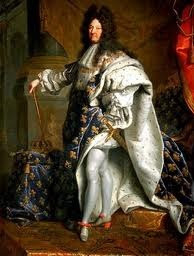Absolutism
Absolutism falls under the Old Regime, which in turn is composed of three other elements: the commercial capitalism and mercantilist policy, the company orders and the colonial system. Thus absolutism must be understood as the manifestation of political power within the Old Regime.
This power was characterized by the full authority concentrated in the sovereign person. There was indeed and divine right. He held up on the conflict of social orders: nobility, clergy and third state in which was inserted thebourgeoisie.
The nation's fundamental laws, customary and religious, were the only limits to the power of the king.
This form of power had two well defined moments. At first, it was simply labeledabsolutism. Then received the name ofenlightened despotism, which meant, ultimately, an apparent overhaul of the old absolutism, since the eighteenth century.
Progress of absolutism in Europe took the same time the formation of national monarchies in the early Modern Times. We can say that the absolutism of progress is a result of changes in national monarchies.
It was during the XVI century absolutism was characterized in some European countries, for example, Spain and England. In France, this process was slowed by international issues first, and religious wars, then.
Nevertheless, it was in France that the absolutism reached its maximum expression in the figure of Louis XIV, the prototype of the absolute king, during the century XVII.
Nevertheless, it was in France that the absolutism reached its maximum expression in the figure of Louis XIV, the prototype of the absolute king, during the century XVII.
In XVffl century, absolutism was replaced in terms of labeling, by Despotism Clarified . The liberal revolutionary movements, started in 1789 with the French Revolution, would put anend to the old regime, in certain European countries, in the course of the nineteenth century.
Progress of absolutism
The real power grew at the same time progressed the National State, whose formation we have seen. King embodied the national ideal, the nation's interest. fact exercised the power, imposed laws, organized justice, leased the collection of taxes, kept the army, appointed officials, all in the name of the state, which he represented.
Wars have accentuated the feeling of love of country, the king was his advocate, a sort of national hero cultivated by humanism , heir of the Christian chivalric traditions. The commercial competition with other countries and the dispute of colonial markets further sharpened the rivalries and contributed to the strengthening of royal power.
This growing power not only resulted from the will of kings, was a necessity of the social body. The strong power was essential that decisions be taken quickly, imposed by the struggle between the nations.
The king suppressed the particularism of territorial communities, provinces, regions, municipalities and villages, contributing to the standardization of the absolutist state. With each of the orders and institutions of society (clergy, nobility, Third Estate, the officer corps, universities, corporations), the sovereign established a specific agreement, preserving their own laws, but exercising discretion in their conflicts, which gave him the right to intervene.
Family rivalries, revival of feudal ties vassalidade, which give rise to struggles between parties involving relatives and aggregates are eliminated.
The struggle between the social orders is, however, the essential feature of this building.Maybe it was not excessive to say that the national monarchy and royal power result from this conflict. The king protects the bourgeois, gives you commercial and industrial monopolies, leases the collection of taxes, protects it from the foreign trade competition, as well as against the nobles and against the Church. On the other hand, protects the artisans against the capitalist entrepreneurs, ensuring their rights.
The struggle between the social orders is, however, the essential feature of this building.Maybe it was not excessive to say that the national monarchy and royal power result from this conflict. The king protects the bourgeois, gives you commercial and industrial monopolies, leases the collection of taxes, protects it from the foreign trade competition, as well as against the nobles and against the Church. On the other hand, protects the artisans against the capitalist entrepreneurs, ensuring their rights.
With absolutism was ennobled bourgeoisie.The old nobility enjoyed military activities, not commercial. I had high standard of living, spending on clothing, housing, balls, consuming their incomes reduced by inflation.So it was forced to approach the king to stay.Received the government of the provinces, senior posts in the royal guard, the strong-squares, pensions for children. The noble courtier depended economically king.
The only limits to the real power in absolutism were the Christian divine law, customary rights of the people, the small number of actual employees and the precariousness of communications. Without considering the problem of inheritance of certain administrative positions, thus escaping the control of the monarch.
Category: General history













0 komentar